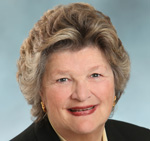As cities worldwide strive to reinvent themselves as hubs of innovation and ideas, it has become clear that a crucial catalyst of this effort is a strong university and research presence.
In San Diego, California, this strategy has no better advocate than Mary Lindenstein Walshok, Ph.D., the Vice Chancellor of public programs and Dean at the University of California San Diego, and an expert on the promise and challenges of the growing innovation economy.
A year after speaking to the Brookings Institution‘s Bruce Katz about the role of “brain hubs” in shaping the global economy, The Planning Report is pleased to present Walshok’s remarks about the ongoing transformation of San Diego that she made at an April 2017 conference called CityAge: Build the Future.
She describes the university’s role as an engine in producing new technologies, a skilled workforce, and economic growth region wide. Here’s what shed said at the CityAge event: I’d like to share with you the value proposition that is bringing the University of California-San Diego downtown. We’re creating a major platform—a central hub—that we’re calling UCSanDiego.Urban. It’s different than just having MBA programs, or a center for urban studies, or classrooms downtown. It represents a 21st century idea of why universities matter, and how great universities can be partners in the transformation of great cities.
In my research, I’ve spent a lot of time listening to what people think makes great cities. Over and over, from developers and community groups, I hear that great cities are walkable places, characterized by accessible and affordable residential and commercial settings. They have cultural and recreational amenities that are engaging and memorable.
Great cities, however, are equally places where employers want to locate, talent wants to work, investors want to invest, and global visitors want to experience. Thirdly, great cities have to continuously recalibrate, renew, and reinvent themselves in response to ever-changing demographic, technological, economic, and global imperatives.
I’d suggest that without a center or centers of intellectual capital that are actively engaged in understanding and helping to navigate the multiple factors shaping regional futures, big cities—like Phoenix, San Diego, Seattle, or Portland—cannot become great cities. If change is the name of the game, then incubating, growing, renewing, and transforming regional economies and the regional landscape is critical to sustainability and to greatness. So I’d like to suggest some ways in which I think great research universities can help create and sustain great cities.
Mary Walshok is a thought leader and subject-matter expert on aligning workforce development with regional economic growth. She has authored more than 100 articles, reports, and book chapters on regional innovation, workforce development and the role of research institutions in regional economies.
As an industrial social scientist focused on the dynamics of regional economic development and transformation, Walshok has studied various communities across America. She has evaluated 13 WIRED regions funded by the U.S. Department of Labor, studied three innovative regions for a National Science Foundation-funded project and assessed one region’s efforts to grow an industry for a Lilly Foundation-funded endeavor.
As head of the continuing education and public programs arm of UC San Diego since 1981, Walshok oversees programs that educate more than 61,000 enrollees annually, which translates to more than 25,000 students in over 4,400 courses. Walshok has developed outreach efforts to help accelerate the San Diego region’s economic vitality, grow the region’s globally competitive talent pool and help college graduates transition to high-demand employment areas. She also helps provide access to a vast array of regional intellectual resources through the award-winning UCSD-TV and nationwide through UCTV.
During her tenure, Walshok has played an active role in helping the University expand its local impact, national reputation and global reach. She is the recipient of numerous awards including the Kellogg Foundation’s Leadership Fellowship and was inducted into Sweden’s Royal Order of the Polar Star.
She currently serves on the boards of San Diego CONNECT (which she helped found in 1985), the La Jolla Playhouse, the United States-Mexico Foundation for Science, the International Community Foundation and the Girard Foundation.
A native of Palm Springs, California, she received her bachelor’s degree in sociology from Pomona College in 1964, her master’s degree in sociology in 1966 and her Ph.D. in sociology in 1969 from Indiana University. She has been a visiting professor at the Stockholm School of Economics for many years and in 2004 held an international appointment in the department of continuing education at Oxford University in England.
Feature photo of San Diego via Adobe Stock.
See full interview with Mark Walshok in The Planning Report.


